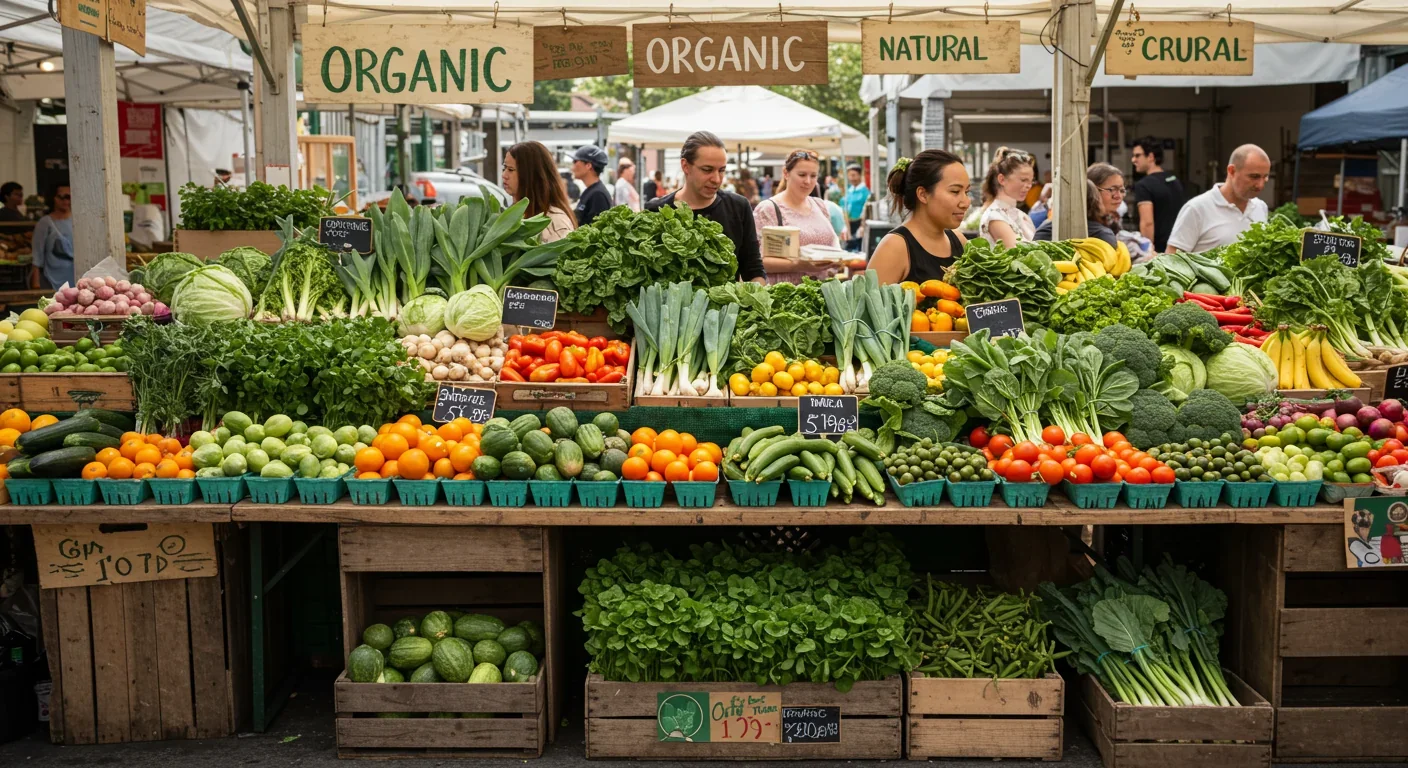Why We Pick Sides Over Nothing: Instant Tribalism Science

TL;DR: The naturalistic fallacy tricks us into believing that natural equals good, but nature contains both life-saving medicines and deadly poisons. Learning to spot this logical error helps you make better decisions about health, food, and ethics based on evidence rather than marketing.

Picture this: You're at the pharmacy, choosing between two pain relievers. One label screams "100% NATURAL!" in green lettering. The other lists a chemical compound you can't pronounce. Which feels safer? If you reached for the natural option without a second thought, you've just fallen for one of the most pervasive logical traps in modern culture. The naturalistic fallacy silently shapes billions of dollars in purchasing decisions, political debates, and personal health choices. It's the assumption that natural equals good, and it's everywhere.
In 1739, Scottish philosopher David Hume noticed something odd in moral arguments. People kept jumping from observations about how the world is to claims about how it ought to be. He called this the is-ought problem, and it planted the seeds for understanding our modern confusion about nature.
G.E. Moore formalized the issue in his 1903 work Principia Ethica. He argued that "good" can't be defined through natural properties. Whether something exists in nature tells us nothing about its moral value. Hemlock is natural. So is cyanide. So is arsenic.
The gap between facts and values isn't just academic nitpicking. When we skip over this logical chasm, we make decisions based on feelings rather than evidence. We treat "natural" as shorthand for "safe" or "right," but nature doesn't care about our wellbeing.
Walk through any grocery store and count the products labeled "natural." The food industry has weaponized this fallacy brilliantly. In the United States, the FDA doesn't strictly regulate the term "natural" on food labels. Companies slap it on products containing high fructose corn syrup, artificial colors, and preservatives.
A 2024 investigation by the Legislative Gazette found that major food corporations use nature-themed packaging and vague health claims to mislead consumers. Products marketed as "natural" often contain the same ingredients as conventional alternatives but command 20-30% price premiums.
The herbal supplement industry exemplifies this perfectly. Americans spend over $8 billion annually on herbal remedies, yet Johns Hopkins Medicine warns that many lack rigorous safety testing. Unlike pharmaceutical drugs, supplements face minimal FDA oversight. Natural doesn't mean tested. It doesn't mean effective. It just means it came from a plant.
Consider kava, a "natural" remedy for anxiety. Several European countries banned it after reports of severe liver damage. St. John's wort, another popular herbal supplement, can interfere dangerously with birth control pills, antidepressants, and blood thinners. The University of Utah Poison Control reports increasing calls about adverse reactions to natural products, especially among people who assumed natural meant harmless.
The Paleolithic diet movement claims we should eat like our ancestors because it's more "natural." Proponents argue that modern agriculture introduced foods our bodies haven't adapted to process. Sounds logical, right?
Harvard School of Public Health researchers found the reality much more complicated. Our Paleolithic ancestors ate whatever they could find to survive. They didn't avoid grains and legumes out of nutritional wisdom but because agriculture hadn't been invented. Their life expectancy was around 30 years. Using their diet as a health blueprint ignores thousands of years of human adaptation and nutritional science.
The paleo movement also cherry-picks which aspects of ancestral life to romanticize. Our ancestors didn't use antibiotics either, and many died from infections we cure with a week of medication. They didn't have vaccines, leading to childhood mortality rates that would horrify us today. Claiming their diet was superior because it's "natural" requires ignoring that they died young from parasites, tooth decay, and infectious diseases.

The natural childbirth movement gained momentum in the 1970s as a reaction to overly medicalized hospital births. Women wanted more control and less intervention. That makes sense. But the pendulum swung too far when advocates began treating any medical intervention as automatically harmful.
A 2016 analysis in The Conversation examined maternal mortality data. Before modern obstetrics, childbirth was one of the leading causes of death for women of reproductive age. Interventions like cesarean sections, epidurals, and labor monitoring have saved countless lives. Vaginal birth carries risks too, including tearing, hemorrhage, and oxygen deprivation for the baby.
The naturalistic fallacy here conflates "how things happened historically" with "how things should happen now." Yes, women gave birth without hospitals for millennia. They also died doing it at rates we'd find unacceptable today. Nature isn't benevolent. It's indifferent.
This doesn't mean all medical interventions are necessary or that patient autonomy doesn't matter. It means we should evaluate procedures based on evidence and individual circumstances, not on whether they align with some imagined natural ideal.
Organic food represents another frontier where the naturalistic fallacy thrives. Surely produce grown without synthetic pesticides must be healthier, right? The science suggests otherwise.
Harvard's Gazette reported on a comprehensive review of nutritional studies. Researchers found minimal nutritional differences between organic and conventional produce. Both contain the same vitamins, minerals, and antioxidants. Organic farming does use pesticides, they're just derived from natural sources rather than synthesized in labs. Natural pesticides can be just as toxic as synthetic ones.
A 2024 investigation by Le Monde found that scientific authorities increasingly question claims about organic food's health benefits. The European Food Safety Authority concluded that current evidence doesn't support claims that organic food is more nutritious or safer than conventional alternatives.
Organic farming does have environmental benefits in some contexts, like reducing synthetic chemical runoff. But that's different from claiming organic food is healthier because it's more "natural." We're conflating ecological considerations with nutritional ones, using the warm glow of "natural" to justify choices that may not align with our stated goals.
The Mayo Clinic offers balanced guidance: choose organic if it aligns with your values and budget, but don't skip fruits and vegetables because you can only afford conventional. The health benefits of eating produce far outweigh any potential risks from pesticide residues at levels found on conventional crops.
The naturalistic fallacy infiltrates political discourse too, often from unexpected angles. Conservative arguments against LGBTQ+ rights sometimes invoke what's "natural" based on reproductive biology. Progressive arguments for environmental protection sometimes claim humans should live "in harmony with nature" as if there's a preset template for human-environment relationships.
Both commit the same error. They try to derive values from facts about nature. But nature contains examples of virtually every behavior imaginable. Homosexuality appears in hundreds of species. So does infanticide, cannibalism, and rape. Pointing to nature can't settle ethical questions because nature doesn't prescribe anything. It just is.
The appeal to nature becomes especially dangerous in policy debates. Climate change deniers sometimes argue that because Earth's climate has changed naturally in the past, current warming must be natural and therefore acceptable. This reasoning fails twice: first, it assumes natural changes are good, and second, it ignores evidence that current warming is driven by human activity and poses serious risks.
Environmental conservation offers a useful contrast. We don't protect endangered species because extinction is "unnatural." Species have gone extinct throughout Earth's history. We protect them because we value biodiversity, ecosystem stability, and our ethical responsibilities toward other living things. These are value judgments, not facts about nature.

Why do we fall for this reasoning so consistently? Psychologists have identified several cognitive factors. Humans evolved in environments where unfamiliar things often posed dangers. Novel plants might be poisonous. Unknown animals might attack. Our ancestors who treated new things with suspicion often survived longer than those who didn't.
This instinct served us well for millennia but misfires in modern contexts. A synthesized medication isn't dangerous because it's unfamiliar. A genetically modified crop isn't harmful because it differs from traditional varieties. We need to evaluate risks based on evidence, not evolutionary holdovers from when "natural" and "familiar" closely overlapped.
The shifting baseline phenomenon compounds this. Each generation accepts the environmental conditions of their childhood as "natural," even if those conditions represent significant degradation from previous generations. What feels natural is often just what we're used to.
Marketing exploits these psychological tendencies brilliantly. Green packaging, rustic fonts, and imagery of farms and forests trigger associations with purity and safety. Companies know that "natural" bypasses our critical thinking because it activates deep-seated preferences for the familiar and ancient.
The stakes aren't just philosophical. In 2019, measles cases reached their highest level in 25 years, driven largely by parents refusing vaccines based on naturalistic reasoning. They preferred to let their children's immune systems handle diseases "naturally" rather than using "artificial" vaccinations. The result: preventable deaths and disabilities.
The COVID-19 pandemic amplified these dynamics. Social media spread claims about "natural immunity" being superior to vaccine-induced immunity. While natural infection can produce antibodies, it requires getting sick first and risking severe complications or death. Vaccines provide immunity without those risks. Calling one approach natural doesn't make it safer or more effective.
Research published in the Journal of the American College of Cardiology found that many people treat herbal supplements as safer alternatives to prescription medications without consulting doctors. This can lead to dangerous drug interactions, delayed treatment for serious conditions, and wasted money on ineffective products.
A particularly tragic example involves cancer treatment. Some patients reject chemotherapy in favor of "natural" remedies like high-dose vitamins, special diets, or herbal preparations. Chemotherapy is brutal and imperfect, but for many cancers, it significantly improves survival rates. Choosing an untested natural alternative because chemicals seem scary isn't empowerment. It's often a death sentence based on a logical error.
Learning to recognize naturalistic reasoning takes practice. Watch for these warning signs:
Claims that older is better: Just because humans did something for thousands of years doesn't make it optimal. We also lived without indoor plumbing and antibiotics for thousands of years.
Vague appeals to nature: When someone says a product or practice is good because it's "natural," ask them to specify what they mean. Natural compared to what? Good in what way?
False dichotomies: Arguments that frame choices as "natural versus chemical" ignore that everything is made of chemicals. Water is H₂O. Natural substances are chemicals too.
Cherry-picked examples: Someone arguing that natural is better might point to successful herbal remedies while ignoring natural substances that are deadly. Aspirin comes from willow bark, but so does salicin, which can cause severe bleeding.
Missing comparisons: "Natural" products should be evaluated against alternatives using the same standards. Does this herbal supplement work better than a placebo? Is organic produce more nutritious than conventional when properly compared?
So how should we evaluate products, practices, and policies if not by whether they're natural? Start with these questions:
What does the evidence show? Randomized controlled trials, meta-analyses, and systematic reviews provide much better guidance than appeals to nature or tradition.
What are the actual risks and benefits? Every choice involves tradeoffs. Medications have side effects, but they also treat diseases. Organic farming may reduce certain environmental impacts but requires more land to produce the same yield.
Who benefits from this framing? When companies emphasize that products are natural, ask whether that claim serves consumers or marketing departments.
What are the alternatives? Natural remedies might seem appealing until you compare them to evidence-based treatments. Context matters.
What values are actually at stake? If you prefer organic food because you care about farmworker safety or environmental sustainability, own those values. They're legitimate. But don't pretend you're making a health choice when you're making an ethical one.
The naturalistic fallacy persists because it feels intuitively right. Natural seems safer, purer, better. Overcoming it requires rewiring these instincts and building new mental habits.
Start by noticing when you feel drawn to products or ideas because they're marketed as natural. Pause and ask what that term actually means in context. A "natural" flavor might be extracted from plants, but it's still processed in a lab. "Natural" sugar is chemically identical to processed sugar.
Extend the same skepticism to your own arguments. When you find yourself thinking something is right because it's how things have always been done, stop. Tradition isn't wisdom. It's just history.
Read beyond headlines. QuillBot's guide to logical fallacies offers tools for identifying flawed reasoning across contexts. When you encounter claims about what's natural or unnatural, dig into the actual evidence. Who conducted the research? Was it peer-reviewed? Do other experts agree?
Support science communication that bridges the gap between research and public understanding. Organizations like CNET's health coverage and Examine.com provide evidence-based analysis without the usual naturalistic framing.
Recognizing the naturalistic fallacy doesn't mean rejecting everything natural or embracing every synthetic product. It means evaluating choices based on evidence rather than etymology.
Buy organic if you care about pesticide runoff, not because you think it's more nutritious. Choose herbal tea because you enjoy the taste, not because you expect it to cure diseases. Support environmental conservation based on values like ecosystem health and future generations, not on assumptions about what's natural.
Most importantly, grant yourself permission to question inherited wisdom. Our ancestors did their best with the knowledge they had. We can honor their efforts while recognizing we now know more about nutrition, medicine, and the world around us.
The next time someone tries to sell you something by calling it natural, remember: arsenic is natural. So is dying from preventable diseases. Nature isn't a moral guide. It's just the universe doing its thing, indifferent to our survival or suffering. We're the ones who decide what's good, what's safe, and what's worth preserving. That responsibility is ours alone, and no appeal to nature can relieve us of it.
The world needs more critical thinkers who can spot logical fallacies and demand better arguments. Now you're one of them.

Ahuna Mons on dwarf planet Ceres is the solar system's only confirmed cryovolcano in the asteroid belt - a mountain made of ice and salt that erupted relatively recently. The discovery reveals that small worlds can retain subsurface oceans and geological activity far longer than expected, expanding the range of potentially habitable environments in our solar system.

Scientists discovered 24-hour protein rhythms in cells without DNA, revealing an ancient timekeeping mechanism that predates gene-based clocks by billions of years and exists across all life.

3D-printed coral reefs are being engineered with precise surface textures, material chemistry, and geometric complexity to optimize coral larvae settlement. While early projects show promise - with some designs achieving 80x higher settlement rates - scalability, cost, and the overriding challenge of climate change remain critical obstacles.

The minimal group paradigm shows humans discriminate based on meaningless group labels - like coin flips or shirt colors - revealing that tribalism is hardwired into our brains. Understanding this automatic bias is the first step toward managing it.

In 1977, scientists discovered thriving ecosystems around underwater volcanic vents powered by chemistry, not sunlight. These alien worlds host bizarre creatures and heat-loving microbes, revolutionizing our understanding of where life can exist on Earth and beyond.

Automated systems in housing - mortgage lending, tenant screening, appraisals, and insurance - systematically discriminate against communities of color by using proxy variables like ZIP codes and credit scores that encode historical racism. While the Fair Housing Act outlawed explicit redlining decades ago, machine learning models trained on biased data reproduce the same patterns at scale. Solutions exist - algorithmic auditing, fairness-aware design, regulatory reform - but require prioritizing equ...

Cache coherence protocols like MESI and MOESI coordinate billions of operations per second to ensure data consistency across multi-core processors. Understanding these invisible hardware mechanisms helps developers write faster parallel code and avoid performance pitfalls.